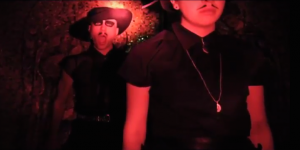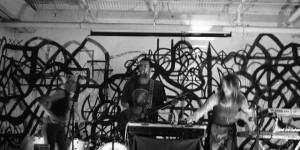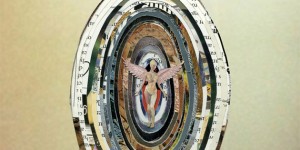Toronto's Doomsquad trip through total time
by Kathryn Kyte
April 20, 2016
Doomsquad's psychedelic siblings explore expansive headspaces on their new album, 'Total Time.'
On their sophomore album, Total Time, Doomsquad link moments of vitriol and inquisition through brooding builds, vocal experimentation and psych-punching production. Sometimes nefarious, sometimes melodious, each song doesn’t rip a conformed message, but rather stabs with a staggering cadence that leaves you feeling a bit off.
Siblings Trevor, Jaclyn, and Allie Blumas started playing together over six years ago and came to fruition in an anything-but-forced way: a simple jam session turned into recording “dumb little honky tonk songs.”
Soon, the band began exploring techno, folk, and renderings in between. They also began seeding lyrics that marked a sociopolitical repertoire in their music, one that is ever present today. Doomsquad want to “shatter the notion that politics and music is taboo and died in the ‘90s,” and their music mirrors this vision.
Total Time follows the trio’s 2015 EP, Pageantry Suite, and their 2014 debut LP, Kalaboogie. The band returned to the outdoors to record, this time venturing to a cabin in New Mexico. Armed with a catalogue of samples and equipment such as a DX7, MicroKORG, guitar, flute, and what they dubbed a hollowed in “UFO hang drum,” Doomsquad made the desert their audio playground for two months.
The album was produced and mixed by Graham Walsh (Holy Fuck) and features additional talent such as Mary Margaret O’Hara, Mike Haliechuk (Fucked Up), David Foster (HUREN), Colin Fisher and Brandon Valdivia (Not the Wind, Not the Flag), and Josh and Jesse Hasko, a.k.a. North America.
I chatted with Doomsquad to find out more about the makeup of the band, what cabin fever does to you, and how the album came to life.
AUX: Being that you’re a band full of siblings, did you find it easier to get to ‘that place’ musically? Did you find it a natural process?
I think it’s more comfortable, actually. It never felt forced in any way. It wasn’t really an intentional thing in the beginning to be like ‘let’s do this family band and be all weird about it’ and if anything the hard part was admitting that we were a family band and coming to terms with all the clichés that are involved in that. On a creative level though, it’s the most natural ever and the easiest.
Each of the songs on your new album are more like memories that evolve. There’s no quick start and finish points to them, I find. Is this a conscious effort?
That’s really nice to hear because that’s how we write our songs. We never really start out in a conventional sense where you can transcribe the song into a three-quarter guitar pattern. It doesn’t start with the song stripped down on a guitar, it kind of just starts off with a vibe or mood or tonal range and then we’ll be conscious of how that makes us feel and then build on that and it becomes a song somehow.
So, it’s a communal effort then, it’s not one person taking the lead?
Well, sometimes at points if someone has a really strong response in the moment they’ll take the lead and we’ll all follow, but it goes off in different directions. It’s not one person steering the ship, but at various times someone jumps in if they really have a strong idea. We’re pretty good at trusting each other and being like ‘OK cool, we’ll follow you on where you’re going to go with that.’
Your first LP was made in the wilderness and then your 2015 EP was in a studio. Now with Total Time you’re out of the recording studio and smack dab in New Mexico — is environment important for you?
100%. So much of our writing and creative process is intuitive and it almost starts in a kind of improvised sense, so the atmosphere, environment all come into play as agents of influence. After our first album we realized that a lot of what was recorded had to do with the environment and landscape, we noticed that we were sponges for that so we made note to make that kind of a thing. But, not always, we would never put ourselves in any kind of box.
Why New Mexico?
We met these twin brothers that lived in Albuquerque and are now based in Brooklyn. They’re called North America and actually they’re joining our band and going to be part of our live show. Anyway, we became close with them during our tour and they told us about the magic of New Mexico and the music scene in Albuquerque — how it’s really quirky energy there.
That was the start, but honestly I think it was the landscape, the desert, something about the skies and mountains, it’s so infinitely creative inspirational. I sound like a cheesy book right now. But yeah, we got lucky and found a cabin that was totally cowboy in the mountains with crazy views and there’s a lot of sci-fi culture there because you know we weren’t far from Roswell. When you spin that together it’s a really heavy mix.
You seem to be quite patient, but steady with the way you release music. Is this intentional or simply just about when you have the time to get to work?
We all do other things too so I think if music was the only things that was occupying our time, it may be different. But, our labels Hand Drawn Dracula and Bella Union in the UK are awesome and have never put any pressure on us to make an album. Just like we would never force or write a song for the sake of it, the same goes with the way we produce music. Although, lately we’ve been doing more remixes and those are commissioned so there’s a timeline and we don’t work the best under that type of pressure but it’s actually fun sometimes to rise to the challenge.
Do you think you are getting into a space (a.k.a. techno) that other electronic producers may say ‘oh you don’t know techno’ or snub at you?
Oh, I’m sure they would say that and I’d probably agree that we don’t. I think for the three of us we are relatively new into exploring this massive artery of music history. It wasn’t long ago that I was actually able to decipher between house and techno, but honestly I think that naivety is good for us. Same way we don’t critique our rocks sounds is the same as we look at this, genres never really exist in our consciousness when were creating.
So you’d probably have a hard time classifying your sound I’d imagine.
Yes, we struggle because the minute somebody hears from us what we call our music, I think it suddenly restricts that person from having their own reaction to it. I think it’s up to the individual to create their own label.
And electronic music perhaps has more expansive ways to crisscross sounds. Is it easier to make, in your opinion?
I think it started out of necessity, like a utilitarian thing. Living in Toronto and actually having studio space is pretty expensive. We’ve played in bands where there are four or five different personalities in a room and there’s a dependence of everyone to bring their A-game to rehearsal. In a way, I know it may sound bad, but when you reduce it all to a sampler and have catalogues and libraries of samples and sounds you can have the same cathartic experience as jamming with a bunch of people, just with the use of a production unit.
How did you guys start learning the ropes?
Well, we started fooling around with Ableton and the sound was new for us, the whole approach was new for us, but between the three of us it was pretty easy because we all have concepts of arrangements and know how to put songs together. It was about finding and sculpting out tones. There just seems to be less limitation, I mean you can spend hours Equing a kick drum and making it sound completely different, which is just fun to do. We never intended to have techno come to life and we could never give up on rock music either because we love it too.
You can hear that variety and expansiveness on the new album, especially with the added help of Graham Walsh. Can you give a bit of background on that whole partnership?
Walsh produced the album, he didn’t come down to New Mexico though. But, before we had gone down there we knew he was going to produce the album so we were sending him mixes as we were recording them just so he could be in on the session but away at the same time you know? Our friend Rob Shortill came down with us so that was really nice to have him working the boards. It was good for me too because the first album I recorded everything and it was hard being the guy that’s recording and also playing the musician hat.
And then there was a flux of other Toronto artists that were part of the album too.
Yeah, I think being connected in the Toronto music community plus collaborating with other artists has been so much fun. It was a dream of ours to work with Mary Margaret O’Hara [who is featured on “The Very Large Array”], so that was an intentional thing, we knew we had to work with her.
A lot of the collaborations and editing was done in Toronto. We gave Graham blocks of 8-minute grooves, some of the vocals were there, but it was a loose structure. Then the songs got sculpted and others were added in like Colin and Brandon from Not the Wind, Not the Flag and Mike (Fucked Up) on guitar. Then, it kind of got the flesh of it out and started to form the songs.
You can really see different mindsets in each song. There’s quiet ambivalence on “Collective Insanity” and then there’s pressing tracks like “It’s the Nail That Counts, Not the Rope” and “Eat the Love,” two of my favourites. Can you elaborate on those tracks and the overall mindset?
When you’re living in a cabin in New Mexico for two months it gets kind of heady and there are peaceful and blissed out times and I think that’s where you get a lot of the solemn mellowed-out songs, but then there’s like cabin fever and you’re antsy and you want to explode and the songs you mentioned came out of that.
So “It’s the Nail That Counts, Not the Rope” was written in response to that cooped up feeling?
Actually, it’s pretty wild how that song came. It started with a heavy beat and I then added heavy guitar and then there was a full moon that night, again the beauty of not working in a studio because you’d never be able to do this. Also, having a friend record, one that you trust, but yeah, there was a bonfire outside and Ali just came running inside the cabin saying that she wanted to lay down the vocals for the song. She said she wanted to do it, but outside by the fire so we rigged up a mic and stretched it outside. She did it one take. It was kind of magic. It was so off the cuff too; it’s her firing out words.
And “Eat the Love”?
“Eat the Love” was a little more meticulously crafted because the horns and Mike’s guitar were added in Toronto so that was a slower build. We knew where we wanted to go with that song so we were pushing to get there.
It’s really nice to see the different techniques you’ve used on the album, so for the first time or ongoing listeners, what do you hope people get out of it?
Mhm, good question: some kind of determination or some kind of movement. I think the album lyrically and intentionally is breaking through restrictions of time or breaking beyond oppressive forces. It is definitely not intended to be an escapist piece, but if someone puts it on and wants to just escape that’s cool. The idea is to kind of make you uncomfortable, ruffle up your base a bit so you have to feel something.
Tags: Music, Featured, Interviews, bella union, Doomsquad, hand drawn dracula, total time





